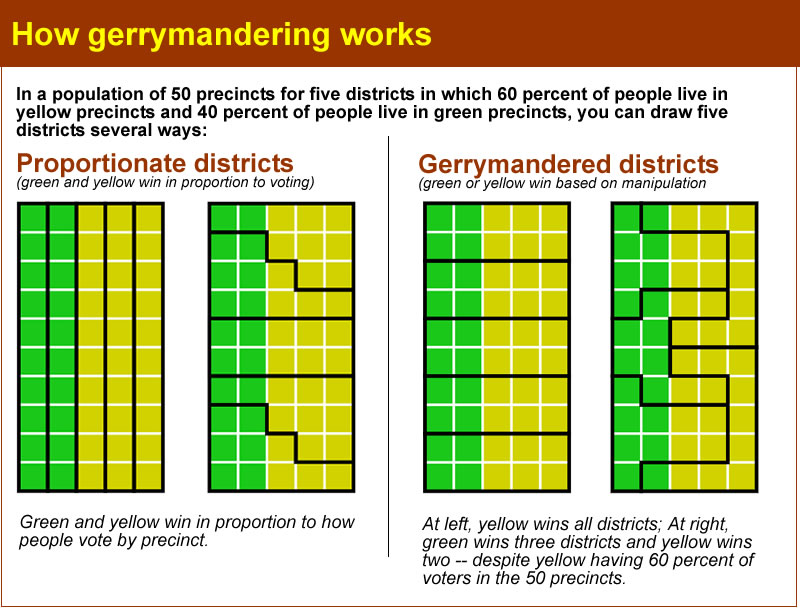
By Andy Brack, editor and publisher | The S.C. General Assembly now has a license to steal your vote, courtesy of the U.S. Supreme Court.
 In a late June decision that surprised many students of representative democracy, the high court ruled it was perfectly fine for state legislatures to draw election district lines for partisan purposes.
In a late June decision that surprised many students of representative democracy, the high court ruled it was perfectly fine for state legislatures to draw election district lines for partisan purposes.
In other words, the justices didn’t say no to past efforts by leaders to make districts more Democratic or Republican. The court essentially said it was OK to gerrymander district lines to give a huge advantage to one party over the other.
And guess who draws the lines? State legislators. In South Carolina – unless something dramatically changes in the 2020 elections for S.C. House and S.C. Senate – the June ruling means Republicans will work hard to create even more safe Republican seats so they can continue their death grip on the legislature.
In turn, that means the court’s decision is a victory for incumbency protection and, at least in South Carolina, for the GOP. It’s a huge loss for fairness and equal representation. And it makes the job of Democrats and third parties even harder. It means that if you live in a partisanized, gerrymandered precinct, your vote won’t really count – because in all likelihood, the favored party is going to win regardless.
This is wrong. It softens and weakens our democracy. Elections should actually be competitive, not artificially manipulated for political purposes.
To get an idea of how this kind of manipulation works, just look to South Carolina’s seven congressional districts today. After the 2010 census, state legislators redrew districts so six of the seven districts so favored the GOP that Democrats were essentially guaranteed only one seat in the U.S. House.
But it didn’t have to be that way. State lawmakers could have redrawn maps in 2010 to shift some voters from the majority-minority district in the middle part of the state to the state’s two coastal districts. By boosting minority voting populations in those two districts by, say, 10 percentage points, Democrats would have had a fair chance of winning those seats. And more importantly, the districts would have looked and felt more like the actual population living there, making it more representative.
The same kind of shenanigans go on in the drawing of districts for S.C. House and S.C. Senate. In 2018, for example, a Statehouse Report study showed that of the 124 state House seats, 42 Republicans and 28 Democrats faced no challengers in the November election. More importantly, only 10 of the 124 elections were actually somewhat competitive, defined very loosely as elections where the margin of victory was less than 20 points.
Unfortunately these days, sophisticated computer mapping systems bundled with robust census data allow redistricting specialists to slice and dice things any way they want. That’s how you get district lines running along bike paths and rivers to connect communities otherwise disconnected. And that’s how you get only 10 truly competitive House districts in a state of 5 million people.
Something has to be done to keep politicians in office from controlling the districts in which they run.
First, urge state legislators to support efforts to draw fair lines by supporting proposed legislation in the General Assembly to do just that. If your official doesn’t sign on to a bill before the end of March, you can call them out – and file against them as being for powermongers against fair elections.
Second, support initiatives to put a constitutional amendment on the November 2020 ballot that would force the creation of a truly independent redistricting commission that would steer the power of drawing lines from legislators to citizens. This has been done in at least nine states – and it’s working to create fairer elections.
Third, vote against anyone who has been called out as being against fair elections.
Finally, if the good old boys are able to draw the lines however they want after the 2020 Census results become available in early 2021, you can give money to groups like the League of Women Voters or S.C. Progressive Network to help them file lawsuits to protect our democracy.
Let’s take away the redistricting car keys from state legislators and put them in the hands of the people.
- Andy Brack’s new book, “We Can Do Better, South Carolina,” is now available in paperback via Amazon.
- Have a comment? Send to: feedback@statehousereport.com.



Pingback: 9 S.C. House races to watch in November - Emerge South Carolina